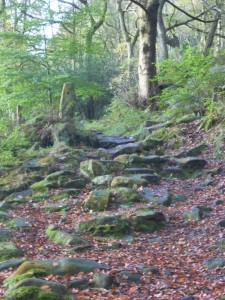
Zoe Jakes performing to Beats Antique. Tribal Fusion belly dance.
This post came about from considering the comments of two friends/colleagues: namely Vivienne Dacosta (Serendipity Viv of Serendipity Reviews) and Joanne Harris. Continue reading


Zoe Jakes performing to Beats Antique. Tribal Fusion belly dance.
This post came about from considering the comments of two friends/colleagues: namely Vivienne Dacosta (Serendipity Viv of Serendipity Reviews) and Joanne Harris. Continue reading
 Labels are tricky things. Getting your name to fit on neatly and above all legibly. Positioning them so people do not have to squint at your bust. Peeling them off without a felted patch of jumper coming away too. Most of all, defining who and what you are… Continue reading
Labels are tricky things. Getting your name to fit on neatly and above all legibly. Positioning them so people do not have to squint at your bust. Peeling them off without a felted patch of jumper coming away too. Most of all, defining who and what you are… Continue reading
 This piece evolved from an exercise set by Emma Jane Unsworth writer and tutor at Lumb Bank, near Heptonstall. The Arvon workshop was called ‘The Art of Beating your Demons.’
This piece evolved from an exercise set by Emma Jane Unsworth writer and tutor at Lumb Bank, near Heptonstall. The Arvon workshop was called ‘The Art of Beating your Demons.’
I hope it might help other writers.
 On Monday 13th July, I am off up to Yorkshire, my homeland. I’m feeling both nervous, and rather optimistic. I will stay at Lumb Bank with the Arvon Foundation, not for the first time so at least I know the ropes.
On Monday 13th July, I am off up to Yorkshire, my homeland. I’m feeling both nervous, and rather optimistic. I will stay at Lumb Bank with the Arvon Foundation, not for the first time so at least I know the ropes.
This time it’s the course itself that really stirs my trepidation. If it’s to do me any good, I have to engage with it – and those ‘demons’. Continue reading
Most writers I know would regard that title as a complete oxymoron. They would greet the word ‘synopsis’ with a moan or at least a frown. I absolutely understand that – for me it was fear.
I didn’t know what to do. So I did what I usually do and bought lots of how-to books. There are a good half dozen on my study shelves. (I would heartily recommend Nicola Morgan’s Write to be Published and the e-book by the way). But they didn’t stop the fear.
I wondered why synopses gave me the jitters – and came up with two main reasons;
Now, on my last Arvon sojourn ( a wonderful Retreat at Lumb Bank with Steve Voake, N. M. Browne and a slew of talented fellow children’s authors) I was grilled.
N. M. Browne by her own admission is the Queen of Awkward Questions. It’s not always comfortable to be interrogated about your story by someone so intelligent and incisive – but it is good. There was no point in me resisting – it was so worthwhile to be made to think harder about my ropey first draft.
I see writing a synopsis as akin to that salutary process.
Options are for first drafts – wander all over that prairie of ideas when you’re creating by all means – but when it comes to editing, the synopsis is your friend.
I use YWriter5. It’s a no-frills way of organising your work created by a writer. One salient feature is the use of chapter descriptions and scene summaries. You don’t have to fill them in, of course – but if you do, they create a synopsis for you.
The crucial point is the way it makes you look at your work – whichever way you tackle your synopsis. You have to focus and analyse:
If you can’t decide what you want each scene to do, how on earth can you get it across to the reader?
So I would say view the writing of your synopsis as a good thing. It makes you understand the anatomy of your story like nothing else. Dissections aren’t pretty – but just ask an artist how essential it is to know the form beneath.
 The viva voce for my MA in Creative Writing was on Monday. I have passed ( thanks to superb tuition from Greg Mosse) – and I am immediately wondering which subset in the Venn diagram of authors I should inhabit.
The viva voce for my MA in Creative Writing was on Monday. I have passed ( thanks to superb tuition from Greg Mosse) – and I am immediately wondering which subset in the Venn diagram of authors I should inhabit.
I’ve been asked to consider writing for adults. Straight off I flinch at that. I will admit to an entire Harry Ramsden’s on my shoulder about the status of children’s writers. It is compounded of my experience as a teacher that your rank is in direct proportion to the age of the children taught; the same impulse that made the ‘Children’s Writing IS a proper job’ badge sell out so quickly in November 2010, and Martin Amis’s remarks in February about brain injury and writing for children. The subtext is that writing for adults is somehow better, cleverer, more valuable.
Well, I’m with John Dougherty:
Don’t worry Martin. We can’t all be imaginative and versatile.
One of the things I admire most about the literature published for young people is the sheer range and breadth of ideas. Big ideas, written for people who will not be blinded by the effulgent beauty of your prose nor give one microfortnight of attention to reviews by your literary chums.
It is notable that David Almond (a literary hero to me) found a sense of liberation in writing for the young. I am put in mind of this concept:
Australian Aborigines say that the big stories—the stories worth telling and retelling, the ones in which you may find the meaning of your life—are forever stalking the right teller, sniffing and tracking like predators hunting their prey in the bush.
Robert Moss, Dreamgates
Quite simply, I believe young people are more likely to be receptive to the stories following me about and asking to be told than adults. And I bother to write because of my belief in those same young people, and what stories are for.
Every word written, every sentence, every story, no matter how dark the story itself might seem, is an act of optimism and hope, a stay against the forces of destruction.
David Almond, Hans Christian Anderson Award acceptance speech
I’d read Stephen King’s ‘On Writing.’ I knew I had to put my work away in a metaphorical drawer for six weeks.
But it’s hard. You’re locking your baby away. Your baby that you’ve cried over, laughed and smiled at. As a writer you have to be totally involved with your work. If you don’t care, why on earth should your reader?
It is, however, entirely necessary to thrust it on one side. You have to have time to develop the emotional distance so that you can stand back and look at it with a critical eye.
If you’re too close, there’s a terrible temptation to fiddle, to tinker with the little safe bits. If it were a wedding dress you might rearrange a few seed pearls on the bodice- whereas it’s the darts that want seeing to.
Now I have to admit that my MA script is a bit of a meringue at the moment. There are some flounces that it really doesn’t need. They are well constructed but detract from the overall effect. They will have to go because they just don’t suit.
I don’t really like it – but I can see it has to be done. The big cuts have to be done first – no point pinning on the broderie anglaise until the overall form is right, is there? Makes me wish my design and my toile had been better.
Ah well – at least with writing, you can cover the joins.
 This week’s blog is later than usual due to the absolute lack of internet at The Hurst in Shropshire. It was a great week full of workshops and advice from the lovely Linda Newbery and Celia Rees around the creation of YA fiction. One of the great bonuses was the opportunity to have work read and a tutorial from each of these successful writers.
This week’s blog is later than usual due to the absolute lack of internet at The Hurst in Shropshire. It was a great week full of workshops and advice from the lovely Linda Newbery and Celia Rees around the creation of YA fiction. One of the great bonuses was the opportunity to have work read and a tutorial from each of these successful writers.
I had my slot with Linda early on – she was as encouraging and helpful as I expected, and has helped me tighten up the beginning of my Scoresby story. It was much appreciated. The chance to ask for Celia’s expertise came on Friday. Truth told, I was a little anxious about this: she had been quite forthright in her opinions all week and I suspected sh.
Nonetheless, I asked her to give my structure the once over – and she was kind enough to offer to read an extract too. I know from my feedback from Ellen Renner some years ago that honest advice is much more useful than cosy niceness. It might be pleasant to be reassured how good your work is – but it won’t advance your understanding much.
So I went and I listened and I learnt: curiously I was more interested in the things she saw needed changing than praise (though that was relished). The stand-out piece of advice, the rocket that soared over the whole bonfire of pertinent observations was:
Don’t get hung up on the ordinary stuff.
Now the immediate context was the overlong first section of my book. Celia explained that although competently written, elements of this detracted from the true story and should go. They were relatively pedestrian and it was time to murder a few darlings.
But there was more to this. Throughout the week, it became clear that quite a few of us often wrote what we felt we ought to, rather than what truly excited us. When we babbled on about our enthusiasms, or better still, wrote using them, our work came alive. So why on earth weren’t we using our true voices?
So the message I’ve taken, burnt into my understanding like the trail of a sparkler, is that mining the resources inside myself will develop who I am as a writer. I’ve never been what you might call ‘normal’, and it’s always ended in tears when I’ve tried to be. Let others write realistic contemporary urban: I’ll stick to my own variety of weirdness.